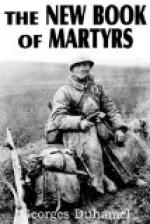The doctor looked at the muscular torso, and his face expressed pity, regret, embarrassment, and, perhaps, a certain wish to go away.
“But this wretched bullet prevents me from moving my legs. You must take it out, doctor, you must take it out!”
The doctor glances at the paralysed legs, and the swollen belly, already lifeless. He knows that the bullet broke the spine, and cut through the marrow which sent law and order into all this now inanimate flesh.
“Operate, doctor. Look you, a healthy chap like me would soon get well.”
The doctor stammers vague sentences: the operation would be too serious for the present ... better wait. ...
“No, no. Never fear. My health is first-rate. Don’t be afraid, the operation is bound to be a success.”
His rugged face is contracted by his fixed idea. His voice softens; blind confidence and supplication give it an unusual tone. His heavy eyebrows meet and mingle under the stress of his indomitable will; his soul makes such an effort that the immobility of his legs seems suddenly intolerable. Heavens! Can a man will so intensely, and yet be powerless to control his own body?
“Oh, operate, operate! You will see how pleased I shall be!”
The doctor twists the sheet round his forefinger; then, hearing a wounded man groaning in the next ward, he gets up, says he will come back presently, and escapes.
XIV
The colloquy between the rival gods took place at the foot of the great staircase.
The Arab soldier had just died. It was the Arab one used to see under a shed, seated gravely on the ground in the midst of other magnificent Arabs. In those days they had boots of crimson leather, and majestic red mantles. They used to sit in a circle, contemplating from under their turbans the vast expanse of mud watered by the skies of Artois. To-day, they wear the ochre helmet, and show the profiles of Saracen warriors.
The Algerian has just been killed, kicked in the belly by his beautiful white horse.
In the ambulance there was a Mussulman orderly, a well-to-do tradesman, who had volunteered for the work. He, on the other hand, was extremely European, nay, Parisian; but a plump, malicious smile showed itself in the midst of his crisp grey beard, and he had the look in the eyes peculiar to those who come from the other side of the Mediterranean.
Rashid “behaved very well.” He had found native words when tending the dying man, and had lavished on him the consolations necessary to those of his country.
When the Algerian was dead, he arranged the winding-sheet himself, in his own fashion; then he lighted a cigarette, and set out in search of Monet and Renaud.
For lack of space, we had no mortuary at the time in the ambulance. Corpses were placed in the chapel of the cemetery while awaiting burial. The military burial-ground had been established within the precincts of the church, close by the civilian cemetery, and in a few weeks it had invaded it like a cancer and threatened to devour it.




